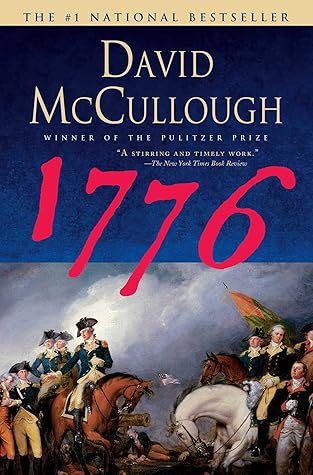More on this book
Community
Kindle Notes & Highlights
As near as could be determined, Washington now had an army of about 7,500, but that was a paper figure only. Possibly 6,000 were fit for duty. Hundreds were sick and suffering from the cold. Robert Morris and others in and around Philadelphia were doing everything possible to find winter clothes and blankets, while more and more of the local citizenry were signing the British proclamation. Congress had fled. Two former members of Congress, Joseph Galloway and Andrew Allen, had gone over to the enemy. By all reasonable signs, the war was over and the Americans had lost.
In Greene, Stirling, and Sullivan he had field commanders as good as or better than any. Though Greene, his best, and the very able Joseph Reed had let him down, both had learned from the experience, just as Washington had, and were more determined than ever to prove themselves worthy in his eyes. Greene, as he would confide to his wife, was extremely happy to have again “the full confidence of his Excellency,” confidence that seemed to increase “the more difficult and distressing our affairs grow.” Henry Knox, a novice artilleryman no longer, and the steadfast John Glover, could be counted on
...more
Washington himself was by no means beaten. If William Howe and others of like mind thought the war was over and the British had won, Washington did not. Washington refused to see it that way. With Lee gone and Congress entrusting him with more power, Washington was fully the commander now and it suited him. Out of adversity he seemed to draw greater energy and determination. “His Excellency George Washington,” wrote Greene later, “never appeared to so much advantage as in the hour of distress.” His health was excellent. The loyalty of those he counted on was stronger than ever.
It had all happened in forty-five minutes or less. Twenty-one Hessians had been killed, 90 wounded. The prisoners taken numbered approximately 900. Another 500 had managed to escape, most of them by the bridge over Assunpink Creek. Incredibly, in a battle of such extreme savagery, only four Americans had been wounded, including Captain Washington and Lieutenant Monroe, and not one American had been killed. The only American fatalities were the two soldiers who had frozen to death during the night on the road.
One of the soldiers would remember his regiment being called into formation and His Excellency, astride a big horse, addressing them “in the most affectionate manner.” The great majority of the men were New Englanders who had served longer than any and who had no illusions about what was being asked of them. Those willing to stay were asked to step forward. Drums rolled, but no one moved. Minutes passed. Then Washington “wheeled his horse about” and spoke again. “My brave fellows, you have done all I asked you to do, and more than could be reasonably expected, but your country is at stake,
...more
For the British the appearance of the Americans at that hour and in such numbers was totally unexpected. “They could not possibly suppose it was our army, for that, they took for granted, was cooped up near Trenton,” Knox would write. “I believe they were as much astonished as if an army had dropped perpendicularly upon them. However, they had not much time for consideration.” Both sides opened fire, and in a battle that quickly escalated on the sweeping open fields and orchard of William Clarke’s farm, the fighting turned as furious as any of the war, the dead and bleeding strewn everywhere.
...more
When, in March 1777, the news of Trenton reached England, it was said (in the London General Evening Post and elsewhere) that the defeat of the Hessians, while “disagreeable,” was “more than counter-balanced” by the capture of General Lee. Lord Germain saw at once that the importance of the news was the effect it would have on American opinion. Still, he had no doubt that the rebel army was all but finished. In New Jersey the fighting would continue sporadically as winter wore on. The war itself would continue, endlessly it seemed to many. In all, it would be another six and a half years
...more
He was not a brilliant strategist or tactician, not a gifted orator, not an intellectual. At several crucial moments he had shown marked indecisiveness. He had made serious mistakes in judgment. But experience had been his great teacher from boyhood, and in this his greatest test, he learned steadily from experience. Above all, Washington never forgot what was at stake and he never gave up.
The war was a longer, far more arduous, and more painful struggle than later generations would understand or sufficiently appreciate. By the time it ended, it had taken the lives of an estimated 25,000 Americans, or roughly 1 percent of the population. In percentage of lives lost, it was the most costly war in American history, except for the Civil War.


